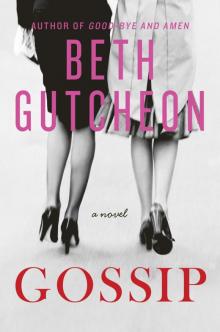- Home
- Beth Gutcheon
Leeway Cottage Page 10
Leeway Cottage Read online
Page 10
There was a pause. Your people. Well, there weren’t any Danes, or pianists as a group, being stripped or beaten or otherwise abused in Austria at the moment, so it was hard to avoid inferring whom she considered “his people” to be. Finally he said, “No one likes to be far from home when home is in trouble, Mrs. Brant. I wish I were closer to my parents.”
“They are in Copenhagen?” Bess asked.
“Yes. I offered to go back but they wouldn’t hear of it, and my father says there’s no need for Danes to be frightened.”
“He thinks Hitler will respect the pact?”
“It is a hope. Denmark is his breadbasket after all. Well, his pork and butter basket.”
“Many believe,” said Candace, “that really, he just wants the traditional German peoples united again. And that’s not unreasonable.”
“If you’re right, Candace, we should be worried that he’ll take Milwaukee,” said Howard Britton.
Laurus said, “There’s a story told that before the pact, Hitler said to our king that the Danes and the Germans had always been such good friends, they should really be under one ruler. King Christian said, ‘You’ll have to talk to my son about that, I am much too old to govern so many people.’”
Even Candace laughed. Privately Laurus doubted his king would have spoken to Herr Hitler on any subject, but when true in spirit, apocryphal stories have their uses.
There was no doubt that the dinner was a great success, at least at Laurus’s end of the table. At the other end, Sydney and Elise struggled to aid Dr. McClintock while Mrs. McClintock chattered to Norris Cummings. But Mrs. Beedle grew more and more fretful, poor old lady, and finally burst out, “I had my reticule! I gave it to her, and I want it now, please!” What could be in it? Medicine? Toothpicks? Something important evidently.
The outburst even interrupted things at the far end of the table and Candace halted the conversation there to listen.
“Whom did you give it to, Mrs. Beedle? To Mrs. Brant?”
“Which one is she?”
“At the head of the table.”
“I can’t see that far, I gave it to the one in the nightgown.”
Candace got up and walked to Mrs. Beedle. She bent over her and spoke softly.
“What did you give me, Mrs. Beedle? How can I help?”
“My reticule. I handed it over when I came in and I want it, please.”
There was a pause. “Mrs. Beedle, dear, I’m afraid you gave me your little dog.”
“But …I need my bag. Bring it, please,” she said.
“I’m afraid we don’t have it. When you came in, you were carrying your little dog.”
Mrs. Beedle looked into Candace’s eyes. Into her expression slowly began to leak fear and confusion.
“I was?” She looked suddenly a hundred years old, mortified and distressed.
“Is there something in the bag that you needed? That I might supply?”
“It doesn’t matter,” said Mrs. Beedle, looking like an actor who had gone up in her lines and couldn’t figure out how to get off the stage to safety.
Candace rang the silver bell standing on the sideboard and said, “Brenda, could you bring Mrs. Beedle’s dog, please?”
“No, ma’am,” she said.
“Excuse me?” This was all Candace needed.
“It didn’t like Velma, ma’am. It went under the stove and won’t come out. It’s growling.”
Laurus rose from the table and disappeared toward the kitchen. The dining room was silent and then everyone began talking at once.
“Is your driver here, Mrs. Beedle?” Gordon Maitland asked.
“I don’t know.”
Sydney got up and hurried to the front door to see if a car and driver were waiting. Meanwhile Bess filled a lot of space with What a heavenly party, and Thank you so much, and So nice to meet, and We really must soon. Molly McClintock talked softly to Mrs. Beedle, and Norris Cummings the Bachelor Beau said sotto voce to Florence Britton that he loathed dachshunds and if he caught it he’d rip its little head off.
Laurus emerged from the kitchen with the dog cupped against his chest. Its eyes were popping out of its head and it shook with fright.
“Here we are, Mrs. Beedle. Safe and sound.” It began to keen and squirm with longing when it saw her. Laurus placed the dog in Mrs. Beedle’s arms. Its nerves were shot by whatever it had been through in the kitchen.
“There,” said Mrs. Beedle, “there…” as confused as the dog.
“We’ll take you home now, Mrs. Beedle. Are you ready?” said Bess. Gordon had gone for the car.
“Thank you so much,” said the McClintocks, when the first group had gone.
“But didn’t you come with the Maitlands?” Candace asked.
“I’ll take you home,” said Norris Cummings.
“Thank you, but we’re glad to walk. It’s a glorious night.”
“All right,” said the Bachelor Beau. “Good night, Candace.”
“I’m sorry about the dachshund,” she said, since she couldn’t very well apologize that her guest of honor had kept calling him Old Flannel Mouth.
“Nasty little German beast,” he said, and went out. (And that was the end of that courtship.)
When the guests were gone, Laurus said, “Thank you for a memorable evening, Mrs. Brant.”
“They never even served the baked Alaska.”
“I love baked Alaska! Let’s have it now!”
Candace looked at him, as if he were altogether a surprise to her.
“Yes, why not,” she said. She rang for Brenda and had the dessert served, with elaborate ceremony, to the three of them.
THE LEEWAY COTTAGE GUEST BOOK
Friday, September 1, 1939
Hitler began bombing Poland today, wrote Colin McClintock. It is the end of hope for the world we knew. A sorry way to finish the summer. Cruise canceled; too much fog.
It was Labor Day weekend. The state fair had opened at the Union fairgrounds, and Sydney was showing Laurus the midway. They were strolling, eating fried potatoes with salt and vinegar, as the news began to spread. They heard it from Al Pease, a boy of the town who hailed them as they were heading for the 4-H tent. (This had been happening to Sydney all summer, town people whose faces she’d seen all her life and whose names she had never known hailing Laurus like old friends.)
“Oh, no,” said Laurus. “Oh, no.” His face looked pale around the lips and eyes, despite his suntan.
“What does it mean?”
“It’s begun. It will be like the last time. Or worse.”
Around them colored lights blazed in the gray day. To Laurus they looked suddenly like the grins of a clown at the birthday party of an unhappy child. The music from the Ferris wheel and carousel burbled merrily. Sydney didn’t know what to do, burst into tears or suggest a turn in the bumper cars.
“I have to get to a radio,” Laurus said. “Do you mind?”
“Of course not.” They were hurrying toward the gate when they met the Cochran girls coming in, laughing. Sydney cut their greetings short. “We have to get to a radio. Warsaw has been bombed, you know.”
“Oh,” said the Cochran girls, and watched as Sydney rushed Laurus off.
All during the weekend they listened to the news. They listened mostly at Leeway, as Candace was hosting a bridge tournament at The Elms. Gladdy McClintock was home at last, with an amazingly attractive beau from California. Laurus and Sydney sat with them and listened to the wireless in the big room where there had been so much music, so many games, so much fun. Dr. McClintock fed the fire in the big stone fireplace. Mrs. McClintock sat with her sewing basket in a pool of yellow lamplight, mending socks stretched over a smooth wooden darning egg. There was a tired crease between her eyes and she kept pursing her lips in an anxious tic she was unaware of.
Dr. McClintock watched his wife from behind his book. He knew she was thinking of Tommy. No mother with a son that age could help it, even if America didn’t get into it.
/> Gladdy and her handsome friend sat on the window seats in the corner overlooking the fog-muffled lawn and played hearts. By Sunday morning it was midday in Europe, and France and England were both at war. Neville Chamberlain came on the air to say that everything he had believed in during his public life had crashed in ruins. Dr. McClintock stood up and walked around the room as if he couldn’t listen to this sitting down, but Chamberlain’s personal despair moved Sydney; she thought suddenly of her father. King George made a speech they heard at noon and President Roosevelt talked to them in the evening.
There were no more entries in the Leeway Guest Book that summer. By Tuesday they knew that Warsaw was in flames.
“My mother studied in Warsaw,” said Laurus, as they walked back to The Elms that evening. “She has lifelong friends there.”
“Call her,” said Sydney.
Laurus was shocked. It was insanely expensive, and the radio signal very hit-or-miss. No one called long-distance. They wrote letters or sent a telegram.
“Laurus, you have to hear her voice. She has to hear yours.”
“It’s the middle of the night there.”
“So? What time do they get up?”
“Six-thirty. Seven o’clock.”
“We’ll book a call for then.”
When they got home, they built a fire in the den where the telephone was, and settled down to play backgammon. “You’re a very kind person, Sydney,” said Laurus a little after midnight.
“Thank you.” She liked compliments. She hadn’t had all that many in her life.
“Are you sure you don’t want to go to bed?”
“I’m sure.”
They played on.
“Unless you want to be alone?” she said at about one-thirty.
“No.”
When it was finally morning in Denmark, his call came through.
When she heard Laurus’s voice in her kitchen in Copenhagen, his mother burst into tears. At once he said, “I am coming home, Mama.”
“No,” she said.
Fortunately for Sydney, he was speaking in Danish, or she would have cried, No! as well.
“You’re going to need me.”
“We don’t. Kaj and Nina are right here.”
“Kaj can’t remember where he left his housekeys. Nina’s a child.”
“I’m putting your papa on.”
Almost instantly his father was on the line.
“What time is it there?” he wanted to know.
“Late. Papa, I think I should come home.”
“I forbid it,” his father said. Laurus was taken aback; this was not the way they talked to each other. He could picture them standing at the phone on the wall by the door, his mother in her blue sweater pulled on over her nightdress, his father in his slippers.
“I should be there. We don’t know what’s going to happen.”
“Nobody needs you here, don’t talk nonsense. We need you right where you are.”
“This is a nightmare.”
“Fine. When we all wake up, then you can come. How’s your girl?”
“Fine, but—”
“Kaere, we’re all right here. Denmark isn’t Poland. The sun is shining and your mother is making coffee. Don’t worry. Live your life.” At least Laurus thought that’s what he said; some words were lost in static.
They had asked the operator to ring back with the charges for the call. The amount was staggering. Laurus and Sydney counted it out to the penny and put it in an envelope with the date. Candace had a great dislike of finding guests’ charges on her phone bill.
Back in New York that fall, Laurus and Sydney spent their evenings with Laurus’s friends, many of whom came from Europe or had family there. They talked constantly of Danzig and Memel and the Polish Corridor, and not just as places on a map. It was irritating to hear New Yorkers on the street chatting about trivia, as if they’d forgotten what was happening.
Imre Benko disappeared. Gudrun and Eric believed he was on his way to France and would make his way to Hungary. He had a fiancée in Budapest and sisters.
Laurus played the piano. He played obsessively, like a man taking a drug. He played Chopin for several weeks, as if he could defend Poland with music.
One evening, when Sydney came to his studio after classes, as she often did, she heard his piano as she came up the stairs. Now he was playing Schumann, the Abschied from the Waldzenen. She stood outside and listened for several minutes. The beauty of his playing was unearthly.
When she knocked, the music stopped.
“Come! It’s open.”
As she came in, he whirled around on his piano stool.
He said, “I made a vow that I wouldn’t play German music. But I can’t help it. It’s so beautiful. It makes me furious.”
She went to him and put her arms around him.
“It’s so hard not to do anything.”
“I know,” she said. “And remember the good Germans. This can’t go on, someone will find a way to stop the Nazis.”
“I want to go to Canada,” he said.
To enlist? Sydney had been about to suggest they go to the bistro down the street for dinner. She was dumbstruck.
Fortunately for her, staying silent was the best thing she could have done, for it left Laurus to imagine her thoughts, fierce and courageous like his.
“But I don’t want to leave you,” he added.
On the morning of Tuesday, April 9, 1940, Nina Moss is asleep in the small room behind the kitchen in the apartment around the corner from Vester Voldgade. She sleeps in a discarded shirt of her brother Laurus, buttery soft, with frayed cuffs and collar. Her middle brother, Kaj, is not at home; he is on call this week, and is sleeping at the hospital where he works. It is very early morning, and Nina is dreaming that she is outside the bakery on the next street, and the baker’s boy is inside, where he inhabits a bright yellow hive of light in a dark world, filled with the scents of butter and marzipan. She is trying to get the boy to sell her kringles out the back door, although the shop isn’t open yet.
Then the sound of the low-flying aircraft gets into the dream. Then she is awake and the dream is gone, leaving the sounds of the planes behind, loud and close over the city. She wants the dream back but has lost all but a sense of the color of the sky outside the bakery, a blue that is almost black like the June sky at midnight. Now it is gone, diluted to invisibility by the colorless light of morning, and the metal-gray burr of airplane noise.
What planes? Danish? British? Nina gets up and goes to the sink to wash her face. Maybe France or England has decided that declaring war means something. The Soviets finally smothered little Finland, though it took all winter, and so far no one has lifted a finger. No wonder she wants her dream back.
She can hear her mother in the kitchen. She goes out, still wearing only Laurus’s shirt, which reaches almost to her knees. In the kitchen, her mother, wearing her wrapper over her long blue nightgown, has opened the window and put her head outside. The fresh-washed smell of April morning is in the room, mixed with the tang of the earth in the window boxes on the sill outside.
“Can you see them, Mama? What is it?”
Ditte pulls her head in and turns around. “Germans,” she says.
Nina takes her place at the window. There are people in the street now, standing in little clumps, looking upward. Nina can hear the inhuman buzz of the machines in the distant sky to the north. Now it again grows louder, coming toward the city. Now very loud. Two boys in the street point upward. Nina looks, and sees. Black crosses. Swastikas. A great flock of leaflets explode from the plane, swirl madly in its tailwind, then settle into a gentle mess of drift to the streets below. Nina watches people stoop to pick up leaflets, or stretch to catch them as they fall. While they read, they stand as if wired to their spots. Some then look to each other and speak, others walk off, carrying the paper, some throw the thing back onto the ground and leave it there. Since throwing things into the street is a very un-Danish thing to d
o, Nina knows this last response is very angry. She pulls herself inside and shuts the window. She and her mother stare at each other.
It is a terrible day. By the time Nina makes her way to the university, German soldiers are in the street, strutting in their green uniforms in a high straight-legged gait that is boastfulness in motion.
Nina finds her friend Harry and his girl-of-the-moment. The girl, who takes her cues from Harry, is in tears of rage. They sit over coffee at a student bar that serves coffee in the morning and beer anytime, surrounded by dark wood and tobacco smoke. From the state radio come instructions from the king and the government to accept the presence of their neighbors from the south; they are here to protect Danish borders from English aggression. There will be, no doubt, some installations to guard the west coast of Jutland, so vulnerable and open to the North Sea, and naturally, some good efficient German attention to the airport at Aalborg, so necessary for refueling German planes en route to Norway. The king will continue to be in his counting house, the government will go on sitting, the civil service will carry on, Danish as usual. To the students, who are young and have shorter memories than their elders, the humiliation of this is scalding. Denmark has fallen with almost no struggle. Thirteen dead, thirteen and it’s over. They are no longer a free people. Norway is fighting on, and Harry feels betrayed by everybody. Hitler. Their elders. Themselves. Nina hotly repeats a little of this to her parents at dinner that night. Her father is content, as the table is loaded with nutty rye bread in thin slices and black bread and Danish butter and plate after plate of fish paste and sausage and cheese and herring and bottles of beer. “It’s good to listen carefully,” he says. “We weren’t wrong to stay out of the last war.”
“We lost plenty in the peace,” Nina retorts. The students have talked all afternoon of Germany, Denmark’s ancient enemy.

 The Affliction
The Affliction Dead at Breakfast
Dead at Breakfast Good-bye and Amen
Good-bye and Amen Leeway Cottage
Leeway Cottage Gossip
Gossip Saying Grace
Saying Grace